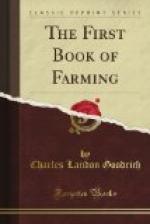When the manure is left in a large pile it suffers losses due to fermentation and leaching.
At the Cornell University Agricultural Experiment Station, five tons of manure from the cow stable, including three hundred pounds of gypsum which was mixed with it, were exposed in a compact pile out of doors from April 25th to September 22d. The result was as follows:
----------------------------+-------------+------------
-+---------- | April 25 | Sept 22 | Loss | | | per cent. ----------------------------+-------------+-------------+---
------- Gross weight | 10,000 lbs. | 5,125 lbs. | 49 Nitrogen | 47 " | 28 " | 41 Phos. acid | 32 " | 26 " | 19 Potash | 48 " | 44 " | 8 Value of plant food per ton | $2.29 | $1.60 | ----------------------------+-------------+-------------+---
-------
When distributed over the field in small piles and allowed to remain so for some time, losses from fermentation take place, and the rain washes plant food from the pile into the soil under and immediately about it. This results in an uneven distribution of plant food over the field, for when the manure is finally scattered and plowed in, part of the field is fertilized with washed out manure while the soil under and immediately about the location of the various piles is often so strongly fertilized that nothing can grow there unless it be rank, coarse weeds.
[Illustration: FIG. 79.—A CROP OF COWPEAS.]
[Illustration: FIG. 80.—RED CLOVER.] When the manure is spread on the surface and allowed to lie for some time it is apt to become dry and hard, and when finally plowed in, decays very slowly.
When the manure is plowed in or mixed with the soil as soon as applied to the field there results an even distribution of plant food in the soil, fermentation takes place gradually and all gases formed are absorbed by the soil, there is very little loss of valuable nitrogen and organic matter, and the fermentation taking place in the soil also aids in breaking down the mineral constituents of the soil and making available the plant food held by them.
Therefore it seems best to spread the manure and plow it in or mix it with the soil as soon as it is hauled to the field, when not prevented by bad weather and other more pressing work.
PROPER CONDITION OF MANURE WHEN APPLIED
A large part of the value of barn manure lies in the fact that it consists largely of organic matter, and therefore has an important influence on soil texture, and during its decay in the soil produces favorable chemical changes in the soil constituents. Therefore it will produce its greatest effect on the soil when applied fresh. For this reason it is generally best to haul the manure to the field and mix it with the soil as soon after it is produced as possible.




